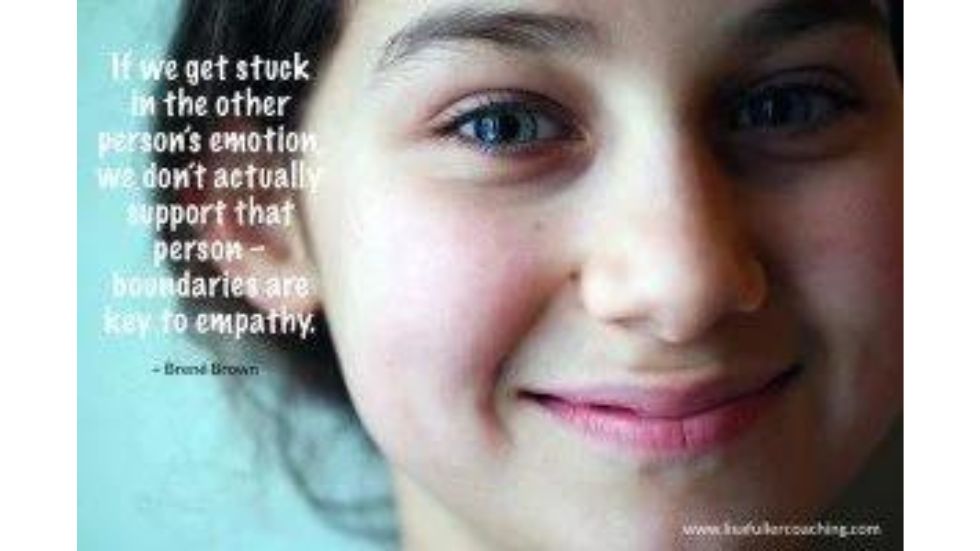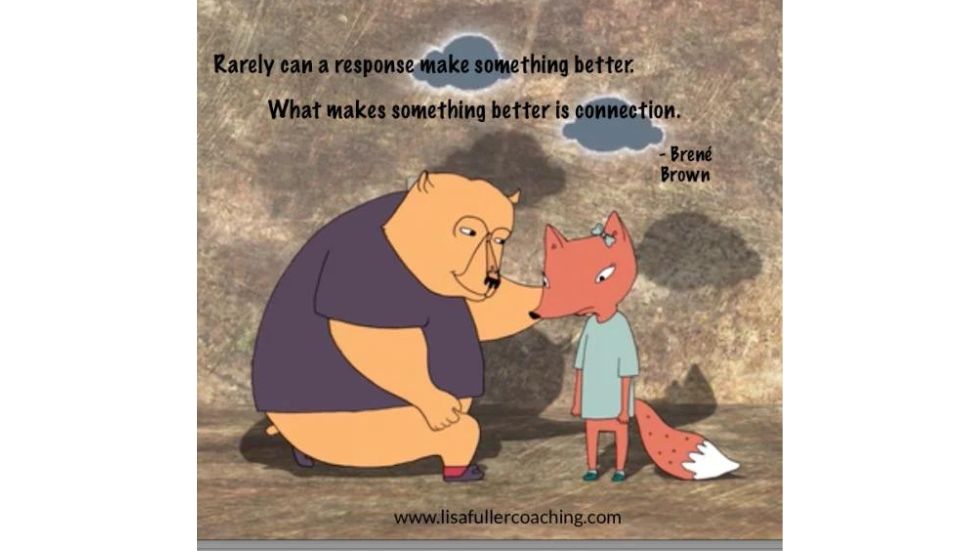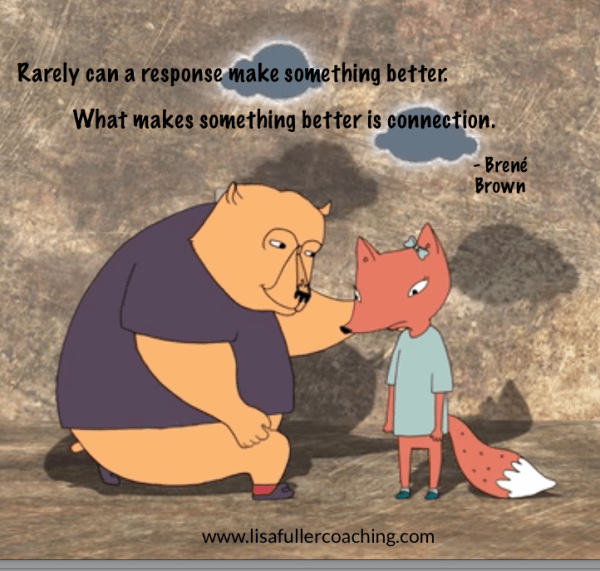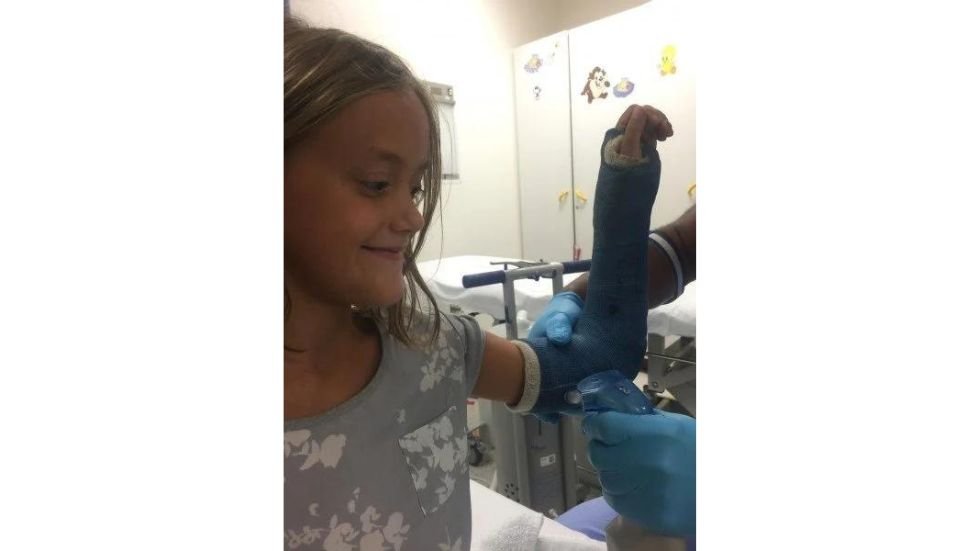by Lisa Fuller | Feb 22, 2023 | Communication, Connection & Love, Encouragement, General
By Kelly Bartlett
I use the word “empathy” a lot when I’m talking about parenting. Sometimes I forget it might not be entirely clear exactly what is meant by using empathy when communicating with children. When you hear or read that children need empathy and that parents can help resolve conflicts and bridge connections with empathy, what do you think? Do you know right away what to do or how to respond?
As Brene Brown so succinctly says, “Empathy is the antidote to shame.” It is what’s needed when a child feels bad, struggles emotionally, or has made a mistake. What children don’tneed in those moments is additional shame tacked on to their mistakes and unpleasant feelings to make them feel worse or unlovable. What children do need is empathy to see them through those moments. Empathy to reinforce your relationship. Empathy to help regulate brain chemistry; to assure a child, “The way you feel is normal. You’re normal.” Empathy to provide validation. “You have a right to feel that way.” Empathy to help a child get on the road to self-acceptance and self-love. “You may have made a mistake, but you are not a mistake.”
Here are five things you can do that will help you respond to a hurting child with empathy:
1. Take your child’s perspective. See the world through his eyes. His problems might seem trivial to you, but try to see them as he does. Broken crayons, lost toys, stuck zippers, or nightly clean-up time mean more to your child in his world than they do to you in yours.
2. Refrain from judgment. Yes, you may disagree with your child. You may think she was “wrong” for what she did, said, or felt during the conflict she had at school that day, but put that aside for now. Your child doesn’t need your judgment, she needs to be able to impart her own judgment. Help her do that by focusing on her feelings regarding what happened.
3. Communicate your understanding of your child’s feelings. This can be a glance, a nod, a knowing look. It’s kindness in the eyes and an “I get it” arm-wrap. It can be words, sure, but above all it’s a message. It’s a message that you understand because you’ve also had similar moments and similar feelings. Let him know you are here as his equal in this moment.
4. Stop before you say BUT. “Yes, you got into an argument with your friend. That happens. He got angry; your feelings were hurt. You’re very upset. BUT, you still should not have hit him…BUT that’s no reason to quit the game…BUT you need to learn how to control your temper.” It’s that last part that needs leaving off–that’s not part of empathy. Empathy is just sitting with the feelings for a bit. That might be really hard! It might feel unfinished. It might feel awkward to stop at, “You were really embarrassed.” and not add on some kind of resolution or suggestion. Don’t go there though…not yet.
5. Instead, try AND. After a period of empathic listening and probably plenty of tears, you can move on.
“…and your friend got hurt.”
“…and now what should we do?”
“…and what if this happens again?”
“…and is there something that will help you in the future?”
“…and is there a way to fix this mistake?”
“…and is there a way I can help you?”
Only after you have helped your child process her feelings through validation and understanding will she be able to move on to problem solving and the “what-to-do-now”s.
When we raise our children with regular expressions of empathy, they will learn through experience just what empathy looks like, sounds like, and feels like, and they will, in turn be able to give it to others.

by Lisa Fuller | Jan 29, 2015 | Communication, Connection & Love, Encouragement, General, Parenting
Q: As the mother of a middle school girl, I struggle to be empathetic without jumping on the roller coaster of her ever-changing moods, emotions and dramas. And, as a woman in her late 40s, my emotions are often a 6 Flags of hormonally-induced thrills, so staying detached feels nearly impossible at times
Recently my seventh grader tried out for the school musical. After a series of micro disappointments this Fall (not making the “A” soccer team, getting put into an advisory group without any good friends, being just slightly outside of the ‘cool’ group, etc.), she was serious about getting a good part for the show. She practiced her song with a singing teacher several times and felt good about it.
Several days went by while she waited for the cast list to be posted. I worked on shifting her language away from ‘good’ and ‘bad’ parts in the show, to some limited success. I wanted to support her enthusiasm but it was draining to stay positive given my fear of the potential bad news ahead.
This daughter can be fairly stoic, but when she saw the cast list, she ran up to her room and sobbed so loudly I was afraid she would choke.
After a few minutes of trying to let her release her disappointment on her own, I went in to check on her. With your thoughts of empathy fresh in my mind, I resisted the temptation to tell her the emotions would pass or it didn’t matter or that the part was probably better than she thought, blah, blah, blah.
Instead, I let her cry, supporting the wildly strong feelings raging through her. Unfortunately, it was just a matter of time before I was crying too, and then we were both sobbing at the injustice of the world (did I mention I am a pre-menopausal woman with raging emotions?)
I managed to get myself together and put her to sleep, but then I could not stop crying. I just felt so sad for her and could not put it away. It took all the strength I had not to email the drama teacher and ask her if there was any way to revisit the cast list. Which is just a simply INSANE thing to even think, let alone seriously consider!
So here’s my question: how can we support our children with their dreams, projects, efforts and goals (especially our daughters) without getting enmeshed in the outcome? How can we let our older children navigate the disappointments and challenges of life without getting sucked into the emotional turmoil that goes along with the journey? Where do you draw the line between empathy and over involvement/attachment?
A: First, Michelle, congratulations on your success in avoiding many of the common barriers to empathy. What you did was no small feat — staying out of judgement, taking her perspective and touching a place in yourself (maybe a bit too deeply) that understood her feelings.
Simply defined as “the ability to understand and share the feelings of another,” empathy is nuanced. While you were able share your daughter’s feelings, it proved difficult to pull yourself out.
To answer your question, here are my ideas to strengthen your empathetic response even more while simultaneously moving you out of the helicopter parenting zone altogether.
From Helicopter Parenting to Empathy
- Validate her feelings. In your story Michelle, you give nice examples of how you did this — letting her cry and stay in her feelings, etc.
- Resist the urge to fix. You write, I resisted the temptation
 to tell her the emotions would pass or it didn’t matter or that the part was probably better than she thought, blah, blah, blah. This is cause for celebration! When you’re done partying let’s look at what you describe your fear of the potential bad news that she didn’t get a “good” part. Your feeling of fear fuels your underlying belief that something needs to be fixed. You can do one of two things here, keep your fear AND bite your tongue, which
to tell her the emotions would pass or it didn’t matter or that the part was probably better than she thought, blah, blah, blah. This is cause for celebration! When you’re done partying let’s look at what you describe your fear of the potential bad news that she didn’t get a “good” part. Your feeling of fear fuels your underlying belief that something needs to be fixed. You can do one of two things here, keep your fear AND bite your tongue, which
you did, or, with the help of a friend, coach or therapist, internally shift your perspective from disappointment = bad to disappointment = opportunity for growth. (I’ll go into this more in my next post). What I’m suggesting is more than a surface shift — that’s why it requires support.
- Share your own story of disappointment. By sharing a simple one sentence story of a time you didn’t make the team or you weren’t invited to the party, you let your daughter know that she’s not alone and most importantly, that she belongs. (A sense of belonging in family is profoundly impactful to a child’s sense of well-being.) For example, I remember when I longed to be chosen to play the role of Mary in the church nativity, yet I wasn’t picked and I felt terribly sad. One sentence that’s it. I can hear parents ask “Isn’t there more to say than that?!” No — children are self focused, your goal here is to simply let them know you’ve been there — voila.
- Be present. It’s not what you say that will make a difference, but simply your presence, your ability to be with your child. Ground yourself in what’s most important to you, tuck your phone and other distractions away and like the Beatles so beautifully sang, let it be.
- Practice mindfulness. Mindfulness strengthens our ability to have boundaries which according to Brené Brown’s research is key to empathy. If we get stuck in the other’s emotion, we don’t actually support that person – boundaries are key to empathy.
One of the many gifts in your story is how fully engaged you are in your daughter’s life.
Thank you Michelle for sharing your story and question, deepening our understanding of empathy. I appreciate and honor your willingness to be vulnerable — it can feel scary to divulge our struggles when we’re “supposed to be” the all-knowing parent!
Are you wanting someone to walk you through a parenting challenge like the one that Michelle shared? If so, visit my schedule to find a time for us to meet via phone or Skype.
I know that parenting is important to you — it’s worth taking time for yourself, so that you can be the parent you want to be, even in your most challenging circumstances.
Take a moment to share in the comment section below how you relate to Michelle’s story and what you want to remember from today’s post.
If you haven’t already done so, join me on this journey!
Wanna talk? Schedule a time here.

by Lisa Fuller | Dec 2, 2014 | Communication, General, Mutual Respect, Parenting, Self-regulation
In my last post, I shared how I missed an opportunity to practice empathy. Today’s story is the unexpected follow-up:
Songbird, my eight year old daughter, was at her cousin’s house. I texted my mom who was in charge, “When’s a good time for pick up?”
Mom texted back, “one hour.”
Five minutes later I receive another text, “Make that 30 minutes.” Then another message shot back “NOW.”
I head over to find Songbird curled up on the couch weeping – big sad boo hoo tears rolling down her cheeks. Mom starts to explain that cousin doesn’t want to share her new modeling clay – I hear a well-known refrain from across the room –
“It’s too special.”
Meanwhile, steady crying from Songbird.
Now comes the tongue biting as I work to keep these thoughts from tumbling out my mouth:
- It’s okay, you can put that on your Christmas list.
- I’m sure she’ll let you play with it, once she’s had it for a while.
- You’re really tired – it’s not a big deal. Now stop crying.
- Now don’t be that way Songbird, you know you can’t get everything you want.
Instead, having recently steeped myself in what empathy is and is not I wait, refrain from the above garden variety of knee jerk reactions.
 Then, consciously I say, you look sad.
Then, consciously I say, you look sad.
Songbird: Yes, I’m really sad!
Me: It seems like your heart hurts.
Songbird: Yes, (boo hooo) it hurts a lot.
Me: I’m sorry sweetie. Let’s say goodbye and go home.
Songbird: (Weep weep) Okay.
Wailing and sobbing continue as we head out to the car – they continue as we drive.
When we arrive home, 10 minutes later, Songbird gets out of the car, singing (makes sense), she skips her way to the door.
All of the usual responses we might use (those I listed above) diminish trust. When we use empathy — in this case, simply acknowledging and naming Songbird’s sadness — we build trust.
Expressing empathy in this situation was simple but not necessarily natural or easy – my bloody tongue is proof!
Simple, how? – all I did was genuinely acknowledge her emotion – naming it and finding a soft place in myself that has known that feeling too.
Not easy, how? I’ll put myself out there and say that although I’ve been teaching Positive Discipline classes for 10 years, empathy is a conscious practice, one that I only feel I’ve recently come to more fully understand.
So, today I’ve made a commitment to myself to practice deliberate empathy – and to expect I’ll make mistakes along the way. I’ll comeback around when I’ve missed the mark and attempt connection through empathy again and again.
According to the work of Theresa Wiseman and Kristin Neff, these five attributes of empathy are key. (You can see the animated video depicting these attributes, narrated by Brené Brown, by clicking the photo above.)
In this list, I’ve included examples of:
1. How I practiced this attribute in my story and
2. Common responses that act as barriers to empathy.
-
Staying out of judgment:
- Keeping my mouth closed about any internal evaluation I’m making as opposed to saying,
- “I don’t know why your cousin hasn’t learned how to share yet – at least you’re a good girl.”
-
Taking the other person’s perspective. What’s that experience like for you?
- “You look like your heart hurts.” instead of…
- “Why are you making it such a big deal? Buck up and move on!”
-
Understanding the emotion you’re hearing. How can I touch within myself something that feels like what my child may be feeling? Check in for clarity by asking questions.
- “You seem really sad.” as opposed to…
- “You really shouldn’t feel that way – you can put modeling clay on your Christmas list.”
-
Communicating our understanding about the emotion. (This seems like overkill for this example, but you might say…
- “Oh I know I feel sad when I don’t get to explore something I’m really curious about” as opposed to…
- Not understanding that emotion… “It’s really aggravating when people don’t share.”
-
Practicing mindfulness.: Rather than pushing away an emotion because it’s uncomfortable, feel it and move through it. If we get stuck in the emotion we don’t actually support the other person– boundaries are key to empathy.
- “Your heart really hurts.”
- “It’s very upsetting that your cousin won’t share with you. I’m pissed about it and will talk to her mom as soon as I can.”
Can you feel how the #2 responses edge out the space needed for empathy? Kids need a safe space to have their feelings so they can move through them and eventually let them go.
Thank you for joining me in exploring the complex nature of empathy.
The two big takeaways:
-
Empathy takes conscious awareness – it isn’t natural, especially with your loved one.
-
Empathy is not about perfection but rather a practice that you can come back to again and again – it takes being open to being vulnerable to do it.
Take a moment to share your empathy hit or miss in the comments below.
Wanna dig deep into empathy and other powerful tools? Contact me for one on one coaching!
If you haven’t already done so, join me on this journey!

by Lisa Fuller | Nov 18, 2014 | Feelings & Emotions, General, Parenting
Until recently I thought I was really good at empathy. This was something I didn’t need to work at – heck, it came naturally! If someone was feeling pain, I was right there with them. My challenge as a young woman working in social work was to turn down my empathy so that I could be of use and make it through the day.
What I’ve become aware of through understanding and playing around with Brené Browns explanation of empathy, is that for me to be genuinely empathetic, particularly with those I’m closest to, I need to be conscious and act against my “natural” reaction to their pain.
Here’s a story from last week to illustrate. My daughter – singing bird – has been through a rough patch this fall which began with her breaking her arm. She got a cast and after two days of the weepies, was up and running. Then a week or so later I got a call from her school informing me she’d taken a bad fall, her body colliding with the concrete playground. Singing bird doesn’t cry easily so when I arrived at the school office to find her in a wimpering ball, I knew it was bad.
What I’d advise a client or friend to do in this situation: When you get your daughter home, ice pack in hand, find a quiet comfortable place where you can simply be together. Create a nest of coziness. Give your child a chance to feel all that she’s been holding in at school, her fear, her pain, her embarrassment…. Without expectations simply spend time with her. By giving her a chance to experience her emotions you’re allowing an important opportunity for her to heal, emotionally and physically. What you’ll be providing is a gift because so often we aren’t permitted our feelings. We’re told, through words and/or actions, to act appropriately. Translation: don’t express feelings of sadness, anger, disappointment, jealousy and even pain.
What I did: When we got home, I helped her out of the car and made her comfy on the couch. I got an ice pack for her head, band aides for her hip, some pain medication and a tasty melt in your mouth homeopathic remedy too. To make sure all of her senses were “soothed”, I found a television show for her to watch to further distract her from her feelings – I mean to make her feel better – heck isn’t it the same thing?
Even as I write this I’m cringing. I missed a rich opportunity to connect with her and more importantly to simply be with her – keep her company through a hard and healing time. Empathy. I avoided it. No doubt, it felt instinctual to go into fix it mode – to make her all better – to put the pain behind her.
Later that afternoon it dawned on me what I’d done. I called my sister and described the incident and how I’d missed a real opportunity for empathy. She thanked me because she was taking her daughter to the dentist for multiple tooth extraction the next day and was encouraged by the reminder.
We don’t have to fix pain or make it go away and it’s actually better if we can find a place within ourselves that allows us to be present.
(If you haven’t seen it, this short animated piece, narrated by Brené Brown is worth watching!)
What does it take for YOU to BE WITH your child when they’re in discomfort – physical or emotional? Please share in the comment section below!
For me, I know that sharing my story with you will help raise my awareness so that when my next empathy opportunity comes, and I know it will, I’ll BE there. Thanks for reading!
If you haven’t already done so, join me on this journey!
Wanna talk? Schedule a time here.

by Lisa Fuller | Apr 29, 2014 | Connection & Love, Cooperation, General, Parenting, Self-regulation
You know those times when you’ve just got to get your child to do something important (go to the doctor, to swim class, the dentist…) and she/he refuses to cooperate? Then you think, “Why can’t they just get with the program this one time? Why does everything have to be so hard?”
Well, let me introduce Susan, mother of 9 year-old Alex, and a recent graduate of my 7-week parenting class. In this story, Susan shares the remarkable shift that happens when she uses tools she learned in the series. Without giving too much away, here are the two conversations (with very different outcomes) between Susan and Alex:
BEFORE taking Positive Discipline Class
Susan: “Hey Alex, Dad and I forgot to tell you – Swim lessons start today, so you need to get ready to go.”
Alex: (Playing with Legos) “What? I don’t want swim lessons! You know I hate lessons!”
Susan: “Alex, learning how to swim is really important – it’s about safety.”(Susan begins to feel angry and thinks, “What’s so hard about going to swim class? Swimming is great. This should be fun. Why is it so difficult?”)
Alex: “I don’t want to.”(He starts to crush his elaborate Lego creations). “I’m not going.”(He sits defiantly on the couch.)
Susan: “Swim lessons are a privilege, young man. That’s enough of your whining. Stop it. Now!”
Alex: “You never ask me what I want – I HATE YOU!”
Susan: (Thinking… “I hate this. I hate how hard it is to motivate my son. Forget it, I give up.”) She stomps off to another room to grab the swim gear.
Susan: “We paid for this class. Now get up and get to the car!”
Susan and Alex are both miserable and swim lesson does not go well.
Sound familiar?
AFTER taking Positive Discipline Class
Susan: (Taking some time beforehand to prepare herself.) “Hey Alex, Dad and I forgot to tell you but you’ve got swim lessons today. I’m really sorry that we’re springing this on you, but we gotta go now. I’ve got your swim gear and a snack for the car.”

“Both of these Positive Discipline Tool Cards were key. I feel I learned the most about the power of validating feelings!“
Alex: “What? I don’t want swim lessons! You know I hate lessons!”
Susan: “Honey, you only have to go four times and we found a new place where there are fewer kids so you’ll be able to hear better.” (She shows remorse for not giving him any warning and feels empathy for him, knowing that while he hates lessons, he actually loves to swim.)
Alex: “I don’t want to!” (He starts to crush his Lego creations.) “I’m not going.” (Alex plops himself defiantly on the couch.)
Susan: “Alex, sweetie, I know this is upsetting, but destroying your Legos is not OK. You can hit a pillow if you’re angry.” (She allows him to express his feelings. She calmly and firmly tells Alex that swim lessons are something he just needs to do. Susan uses only one or to sentences instead of lecturing him.)
(Alex violently hits the pillow. Susan leaves the room. Then she remembers that staying with him might feel encouraging to him. She goes back and keeps him company but doesn’t try to fix or change his feelings.)
Susan: (After some time has passed, speaking gently…) “Honey, it’s time to go.” (Alex gets up and together, they walked to the car. During the drive Susan felt connected to her son through their easy conversation and a palpable sense of calm. Alex even seemed to enjoy the lesson!)
This story’s a beautiful example of how empathy and encouragement go a long way toward winning genuine cooperation. Through her use of grounded positive energy and empathy Susan not only accomplished her goal of getting Alex to his swim lesson, she laid the groundwork for a foundation of trust.
Later she she told me,
It was a tiny miracle that I didn’t lose it and Alex was able to get up to walk to the car. It worked mostly because I didn’t flip my lid. Being there while he hit the pillow actually calmed me down too! Now Alex is doing great with his lessons. He still complains, but there is an ease and matter-of-factness about our interactions.
Thank you Susan for sharing your story!
If you’re curious about deepening your parenting practice and learning the art of cooperation through empathy, check out my one-on-one coaching opportunities and it you’re in the Bay Area, my fall Positive Discipline Series.
CONSIDER⇔SHARE⇔ACT
What gets in your way of just being with your child while they’re caught up in a feeling? Next time a big emotion hits, try bearing it with an attitude of love and let us know what happens!!


 to tell her the emotions would pass or it didn’t matter or that the part was probably better than she thought, blah, blah, blah. This is cause for celebration! When you’re done partying let’s look at what you describe your fear of the potential bad news that she didn’t get a “good” part. Your feeling of fear fuels your underlying belief that something needs to be fixed. You can do one of two things here, keep your fear AND bite your tongue, which
to tell her the emotions would pass or it didn’t matter or that the part was probably better than she thought, blah, blah, blah. This is cause for celebration! When you’re done partying let’s look at what you describe your fear of the potential bad news that she didn’t get a “good” part. Your feeling of fear fuels your underlying belief that something needs to be fixed. You can do one of two things here, keep your fear AND bite your tongue, which





